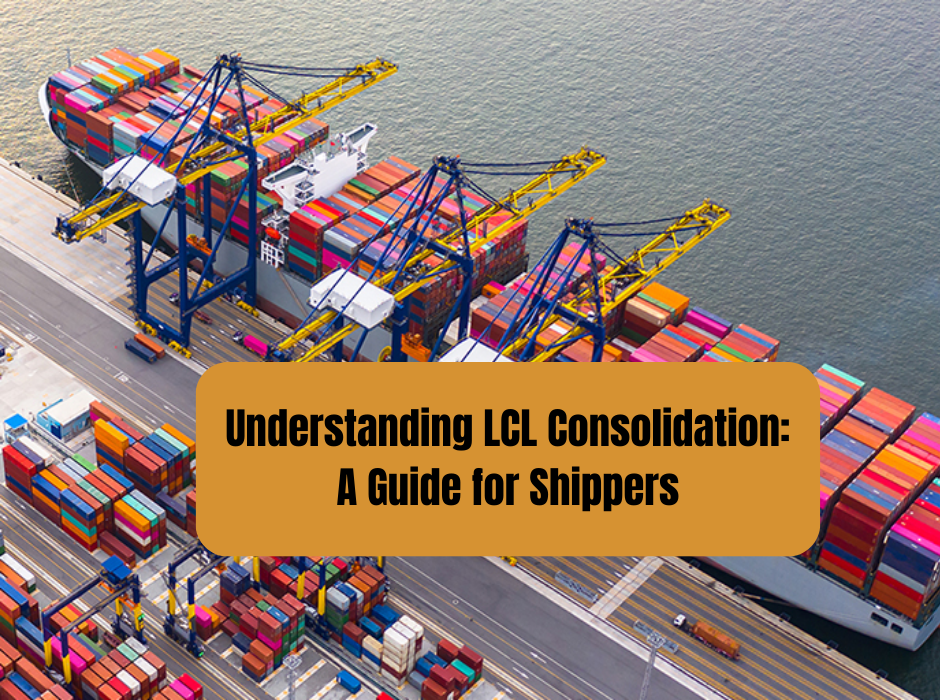LCL Consolidation, also known as Less than Container Load consolidation, is a cost-effective and efficient shipping method that allows multiple shippers to combine their cargo into a single container. This guide provides shippers with a comprehensive understanding of LCL consolidation, its benefits, and how it can lead to significant cost savings.
LCL consolidation is particularly beneficial for shippers who have smaller cargo volumes that do not require a full container. Instead of booking an entire container for their shipments, they can opt for LCL consolidation and share container space with other shippers. This approach maximizes container utilization, reduces transportation costs, and minimizes the environmental impact associated with empty or underutilized containers.
Here are the key aspects of LCL consolidation that shippers should consider:
How LCL Consolidation Works:
LCL consolidation involves consolidating cargo from multiple shippers into a single container at a consolidation center or warehouse. The cargo is carefully packed and secured to ensure safe transportation. At the destination port, the container is deconsolidated, and each shipper’s cargo is separated and delivered to their respective consignees.
Benefits of LCL Consolidation:
- Cost Savings: LCL consolidation enables shippers to share the costs of container transportation, handling, and customs clearance, resulting in significant cost savings compared to booking a full container.
- Flexibility: Shippers with smaller cargo volumes can take advantage of LCL consolidation without the need to wait for a full container load. This flexibility allows for more frequent shipments and faster delivery times.
- Global Reach: LCL consolidation services are available for both short-distance and long-distance shipments, providing shippers with access to a wide network of destinations worldwide.
- Reduced Risk: Consolidation centers have experienced staff who handle cargo consolidation, ensuring proper packing, documentation, and compliance with shipping regulations. This reduces the risk of errors or delays in the shipping process.
- Sustainable Shipping: LCL consolidation contributes to sustainable logistics by optimizing container space and reducing the carbon footprint associated with empty or partially filled containers.
Choosing a Reliable LCL Consolidator:
Selecting a reputable LCL consolidator is crucial for a successful consolidation process. Consider the following factors when choosing a consolidator:
- Network and Coverage: Look for consolidators with an extensive global network that covers your desired destinations.
- Experience and Expertise: Consider consolidators with a proven track record and expertise in handling LCL shipments, customs clearance, and documentation requirements.
- Security and Safety: Ensure that the consolidator maintains high standards of security and safety throughout the consolidation and transportation process.
- Tracking and Visibility: Look for consolidators that provide real-time tracking and visibility of your cargo, allowing you to monitor the status of your shipment.
Packaging and Labeling:
Proper packaging and labeling are crucial for LCL consolidation. Ensure that your cargo is packed securely, using suitable materials and techniques to protect it during transportation. Clearly label your cargo with all the necessary information, including shipper and consignee details, to avoid any confusion during deconsolidation.
Documentation and Customs Clearance:
Accurate documentation is essential for smooth customs clearance and efficient transit of your cargo. Work closely with your consolidator to ensure all required documents, such as commercial invoices, packing lists, and certificates of origin, are prepared correctly and submitted on time.
Cargo Insurance:
Consider obtaining cargo insurance to protect your shipment against loss, damage, or theft during transit. Discuss insurance options with your consolidator or insurance provider to determine the most suitable coverage for your cargo.
Communication and Collaboration:
Maintain clear and open communication with your consolidator throughout the shipping process. Provide accurate and timely information regarding your cargo, shipment schedules, and any specific requirements. Collaborate closely with your consolidator to address any concerns, clarify instructions, and ensure smooth coordination between all parties involved.
Transit Time and Delivery:
While LCL consolidation offers cost savings, it’s essential to consider that the transit time may be longer compared to a full container shipment. The consolidation process and potential stops at different ports for cargo loading and unloading can extend the overall shipping time. Discuss estimated transit times with your consolidator and communicate any specific delivery requirements to avoid any delays or complications.
Cargo Tracking and Visibility:
Utilize the tracking and visibility services provided by your consolidator to stay updated on the status and location of your shipment. This information enables you to plan and coordinate downstream activities such as inventory management and distribution.
Post-Delivery Considerations:
Upon delivery of your cargo, conduct a thorough inspection to ensure it arrives in good condition. Notify your consolidator promptly if there are any damages or discrepancies. Provide feedback on the consolidation process to help improve future shipments and maintain a strong working relationship with your consolidator.
To summarise, LCL consolidation is a cost-effective and efficient transportation method that provides various benefits to shippers with lower cargo volumes. You may maximise the benefits of LCL consolidation and achieve considerable cost reductions by selecting a reputable consolidator, correctly packing and labelling your cargo, guaranteeing accurate paperwork, and maintaining good communication. Accept this environmentally friendly logistics option to maximise container capacity, cut transportation costs, and contribute to a greener shipping sector.



